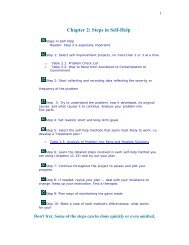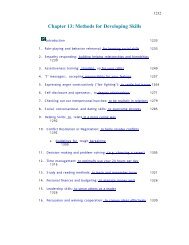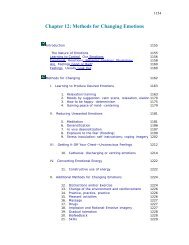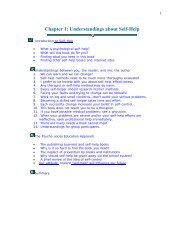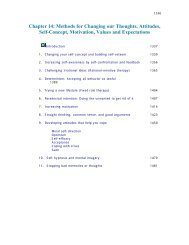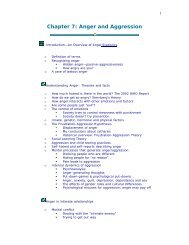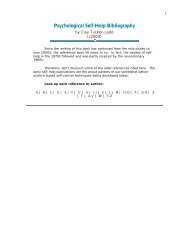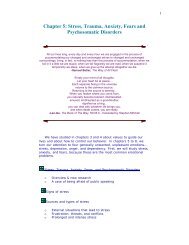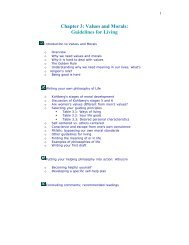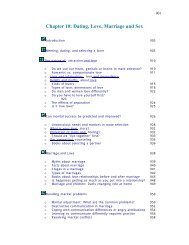Methods for Changing Behaviors - Psychological Self-Help
Methods for Changing Behaviors - Psychological Self-Help
Methods for Changing Behaviors - Psychological Self-Help
You also want an ePaper? Increase the reach of your titles
YUMPU automatically turns print PDFs into web optimized ePapers that Google loves.
occurs--that's called contingency management or contracting. That is<br />
this method.<br />
Many people believe that most things we do voluntarily are the<br />
result of rein<strong>for</strong>cement, that there are payoffs (or hopes <strong>for</strong> one) <strong>for</strong><br />
everything we do (see method #9). If that is the case, the good selfcontroller<br />
would surely be (l) busily investigating the behavior-rewards<br />
connections and (2) making certain their good traits (caring, loving,<br />
self-discipline) are well rewarded or per<strong>for</strong>med right be<strong>for</strong>e some<br />
pleasurable life event (like eating or going to the bathroom or being<br />
appreciated by others).<br />
In method #2, we are designing and learning a better behavior <strong>for</strong><br />
getting the rewards we want. In this method, however, we (selfmodifiers)<br />
are changing the consequences to get the behaviors we<br />
want. Or, we (learners) are agreeing to behave in new (probably<br />
already learned) ways to get some payoff we want.<br />
Rewards may be viewed as (1) a source of motivation or (2)<br />
rein<strong>for</strong>cers of the strength of the preceding response as a habit. Both<br />
are accurate views. We use rewards to encourage desired behavior to<br />
occur now and in the future. Chapter 4 has a section explaining more<br />
about rein<strong>for</strong>cement.<br />
<strong>Self</strong>-helpers need to consider the entire context of their<br />
self-rein<strong>for</strong>cement.<br />
Keep an overall perspective: This method helps you single out a<br />
simple behavior and carefully administer repeated rewards to<br />
strengthen the desired action. However, while trying to change one<br />
minuscule behavior, one must not <strong>for</strong>get that there are thousands of<br />
other behaviors, some rewarded <strong>for</strong> years and well established habits,<br />
which are competing with the single behavior you have decided you<br />
want to occur more often. Only the strongest or most rein<strong>for</strong>ced<br />
behavior gains the right to occur. It is important to keep in mind the<br />
universe surrounding you, namely, hordes of swirling habits<br />
accumulated over a lifetime and a myriad of rein<strong>for</strong>cers ready to be<br />
attached to many behaviors. Consider these examples in which this<br />
morass messes up your self-control.<br />
(1) Strong old habits are powerful, ask any smoker, any beer<br />
lover, any social or Internet addict, any late night snacker, and on and<br />
on. New habits are weak and need special and frequent rein<strong>for</strong>cement.<br />
Naturally occurring powerful rein<strong>for</strong>cements may often mess up<br />
your long-term self-help ef<strong>for</strong>ts. You will have to reduce or control<br />
them. Consider these examples--fast food, desserts and candy destroy<br />
healthy diets; watching TV and drinking a beer make exercising very<br />
unlikely; good tasting soothing cigarettes lead to illness, not health;<br />
anger enables you to get your way but you lose friends and loved<br />
ones; passivity saves you from confrontation but leads to domination;<br />
habitually thinking "I can't ____ " avoids the hard work of trying, etc.<br />
1124



